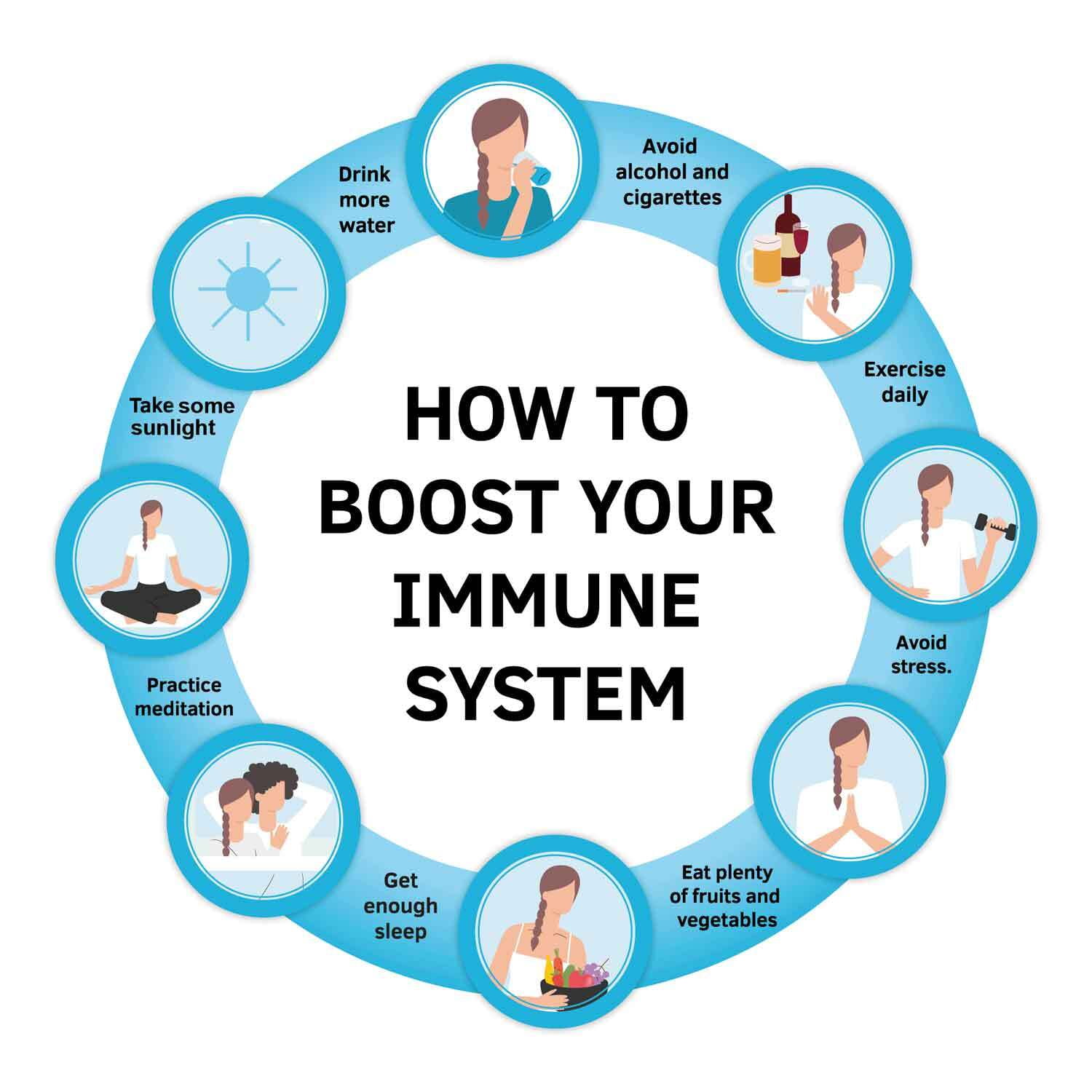Best Ways To Boost Immune System: Staying healthy is a top priority, and a strong immune system is key. But with so much conflicting information out there, how do you know what actually works? This guide cuts through the noise, exploring proven strategies to naturally bolster your body’s defenses. We’ll cover everything from nutrition and lifestyle tweaks to understanding the role of supplements and preventative measures.
Get ready to unlock your body’s incredible power to fight off illness!
From optimizing your diet with immunity-boosting nutrients and gut-friendly foods to prioritizing sleep, managing stress, and incorporating regular exercise, we’ll explore a holistic approach to immune health. We’ll also delve into the evidence-based benefits (and potential drawbacks) of herbal remedies and supplements, and discuss the importance of hygiene and vaccination in preventing infections. Whether you’re looking for small changes to make a big impact or a complete overhaul of your wellness routine, this guide offers practical steps to a stronger, healthier you.
Nutrition for Immune Support
Source: healthwebmagazine.com
Proper nutrition plays a crucial role in bolstering your immune system’s ability to fight off infections and maintain overall health. A balanced diet rich in essential vitamins, minerals, and antioxidants is key to supporting your body’s natural defenses.
Vitamins and Minerals for Immunity
Several vitamins and minerals are vital for immune function. These nutrients contribute to various aspects of the immune response, from cell growth and development to the production of antibodies.
| Nutrient | Sources | Immune Benefits | Notes |
|---|---|---|---|
| Vitamin C | Citrus fruits, berries, peppers | Supports antibody production, antioxidant properties | High doses may cause digestive upset. |
| Vitamin D | Sunlight exposure, fatty fish, egg yolks | Modulates immune cell activity, reduces inflammation | Many people are deficient; supplementation may be necessary. |
| Vitamin E | Nuts, seeds, vegetable oils | Antioxidant, protects cells from damage | Acts as a powerful antioxidant. |
| Vitamin B6 | Poultry, fish, bananas | Essential for antibody production | Important for cell function and immune cell development. |
| Vitamin B12 | Meat, poultry, dairy | Supports cell growth and development | Important for overall immune cell health. |
| Folate | Leafy greens, legumes | Supports cell division and growth | Essential for immune cell production. |
| Zinc | Meat, poultry, beans | Supports immune cell function, wound healing | Deficiency weakens the immune system. |
| Selenium | Brazil nuts, seafood, eggs | Antioxidant, supports immune cell function | Plays a role in inflammation reduction. |
| Iron | Red meat, spinach, lentils | Essential for oxygen transport to immune cells | Anemia can impair immune function. |
Antioxidants and Immune Function
Antioxidants neutralize harmful free radicals, protecting cells from damage and supporting immune cell function. A diet rich in antioxidants can help reduce inflammation and strengthen the immune response.
Examples of antioxidant-rich foods include berries, dark chocolate, leafy greens, and nuts.
Gut Health and Immunity, Best Ways To Boost Immune System
The gut microbiome plays a significant role in immune health. A diverse and balanced gut flora supports immune function and helps prevent infections. Probiotics, live microorganisms, and prebiotics, food for probiotics, contribute to a healthy gut microbiome.
Dietary Approaches for Immune Enhancement
The Mediterranean diet, characterized by its emphasis on fruits, vegetables, whole grains, and healthy fats, has been associated with improved immune function. However, individual dietary needs vary, and consulting a registered dietitian or healthcare professional is recommended for personalized advice.
Lifestyle Factors and Immune Health: Best Ways To Boost Immune System
Lifestyle choices significantly impact immune function. Maintaining a healthy lifestyle through regular exercise, sufficient sleep, stress management, and avoiding harmful substances is crucial for a strong immune system.
Exercise and Immunity
Regular physical activity enhances immune function by improving circulation, reducing inflammation, and promoting the production of immune cells. Various types of exercise, including aerobic exercise, strength training, and yoga, offer immune-boosting benefits.
Sleep and Immune Response
Adequate sleep is essential for immune function. Adults typically require 7-9 hours of quality sleep per night. Sleep deprivation weakens the immune system, increasing susceptibility to infections.
Stress Management and Immune Health
Chronic stress weakens the immune system. Effective stress management techniques, such as mindfulness, meditation, and regular exercise, can significantly improve immune function.
Harmful Substances and Immunity
Smoking and excessive alcohol consumption severely impair immune function, increasing the risk of infections and chronic diseases.
Infographic (Text-Based): Harmful Effects of Smoking and Alcohol
Smoking: Damages lung tissue, reduces immune cell activity, increases inflammation.
Alcohol: Depresses immune cell function, impairs nutrient absorption, increases susceptibility to infections.
Herbal Remedies and Supplements

Source: nyp.org
Various herbal remedies and supplements are purported to boost the immune system. However, scientific evidence supporting their efficacy varies, and it’s crucial to approach their use cautiously and consult with a healthcare professional.
Immune-Boosting Herbal Remedies
- Echinacea: May reduce the duration and severity of colds.
- Elderberry: Some studies suggest it can shorten the duration of influenza.
- Ginseng: May enhance immune cell activity, but more research is needed.
Herbal Remedy Interactions
Herbal remedies can interact with prescription medications. It is crucial to inform your doctor about any herbal remedies you are using.
Scientific Evidence for Immune-Boosting Supplements

Source: boxybite.com
Understand how the union of two guys kissing meme drawing can improve efficiency and productivity.
The scientific evidence supporting the efficacy of many immune-boosting supplements is limited or inconclusive. Many studies are small or lack rigorous methodology.
Consulting a Healthcare Professional
Always consult a healthcare professional before using herbal remedies or supplements, especially if you have pre-existing health conditions or are taking other medications.
Hygiene Practices and Infection Prevention
Practicing good hygiene is crucial in preventing the spread of infections. Simple measures like handwashing, sanitization, and vaccination significantly reduce the risk of illness.
Effective Handwashing
- Wet your hands with clean running water.
- Apply soap and lather well.
- Scrub your hands for at least 20 seconds.
- Rinse thoroughly under running water.
- Dry your hands with a clean towel or air dry.
Vaccination
Vaccinations are a highly effective way to protect against infectious diseases. Essential vaccines for adults include influenza, tetanus, diphtheria, and pertussis (whooping cough).
Avoiding Pathogen Exposure
Practicing social distancing when necessary, avoiding close contact with sick individuals, and frequently cleaning and disinfecting surfaces can help prevent exposure to pathogens.
Proper Use of PPE
Proper use of personal protective equipment (PPE), such as masks and gloves, is crucial in healthcare settings and other situations where exposure to pathogens is likely. Proper donning and doffing procedures should be followed.
Managing Chronic Conditions and Immune Function
Chronic conditions such as diabetes, heart disease, and autoimmune disorders can significantly impact immune function. Effective management of these conditions is crucial for maintaining a strong immune response.
Impact of Chronic Conditions on Immunity
Chronic conditions often lead to impaired immune function, increasing susceptibility to infections and complications. For example, poorly controlled diabetes can damage blood vessels and impair immune cell activity.
Improving Immune Response Through Chronic Condition Management
Effective management of chronic conditions through medication, lifestyle changes, and regular medical check-ups can significantly improve immune response.
Supporting the Immune System in Individuals with Chronic Illnesses
Strategies for supporting the immune system in individuals with chronic illnesses include maintaining a healthy diet, getting adequate sleep, managing stress, and following medical advice.
Resources and Support
Numerous resources and support groups are available for individuals managing chronic conditions. These resources can provide information, emotional support, and practical assistance.
Closure
Ultimately, boosting your immune system is a journey, not a race. It’s about making sustainable lifestyle choices that support your overall well-being. By focusing on a balanced diet rich in essential nutrients, prioritizing sleep and stress management, incorporating regular exercise, and practicing good hygiene, you can significantly enhance your body’s natural defenses. Remember to consult your doctor before starting any new supplements or making drastic changes to your health routine.
Take charge of your health and empower your immune system – your body will thank you for it!



